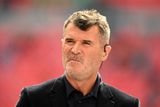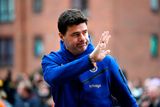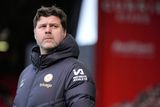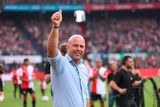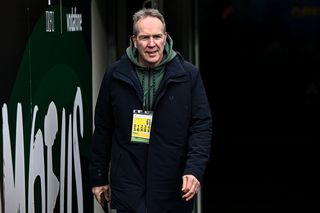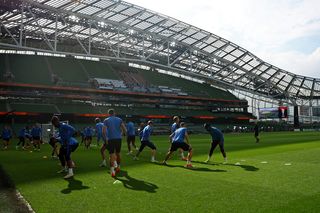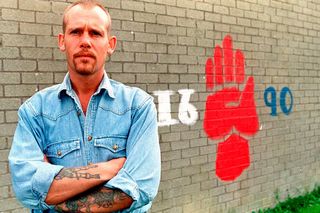Ireland is no longer home to City star
Stephen Ireland
T oday Stephen Ireland will be at home. Surrounded by Brazilians, millionaires and billionaires, he will be relaxed. In the glare of the weekend's biggest game in the world's richest league, he will be comfortable and he will feel safe. He is currently the outstanding player in the Premier League and this is where he belongs -- in Manchester.
In some ways, there has been no exile for Ireland from international football. In many ways, every time he went to Ireland he was exiled, exiled from Manchester and Manchester City, the town and the club which took him in and gave him a voice.
There are a million things in Stephen Ireland's head and sometimes as many voices. There are familiar refrains and alarming tales. "He has been badly advised," said one, and while the comment was supposed to be a reflection on the quality of those around him, it could apply equally to those times when he takes his own counsel. "I think Stephen would be happy if he could play twice a month at Eastlands and never have to leave Manchester," says another who has followed his career since he left Cork.
But those who watched a restless, unsettled footballer at Ireland would not understand the view of those in Manchester. "He is an absolutely dedicated footballer," says Frankie Bunn, a former coach at Manchester City who remembers Ireland as "the last to leave the training ground, a willing listener. He lived for football."
Stephen Ireland grew up living for football. This season, he has consistently demonstrated the talent of the street footballer. The goal he scored at Hull two weeks ago was an example of a street footballer who is confident that the talent of the streets can now be relied upon at the highest level.
Talk to people in Cobh and they will tell you all about Stephen Ireland. But they won't recognise the stories of a bad boy or a player distracted by the celebrity of the game. Those who knew Stephen Ireland then remember a boy who lived for football, whose father gave everything he could to help him. Those who know him now and who knew him then say he hasn't changed.
Ireland may be one of the most gifted players this country has produced in a generation but the gift was nurtured every day. As a boy, he spent every minute playing football and his father Michael, an underage international himself, encouraged his son, always, despite some hard times, providing new football kit and even, as soon as they were brought out, a brand new pair of Predator boots.
"The qualities he has now were in evidence when he was very young," says Eamon Collins, the former St Pat's and Shelbourne manager who first remembers seeing Ireland in the Kennedy Cup.
"The thing that struck me about him then was that he had a tremendous engine, that every time the ball went out wide he would make these great runs into the box. The only worry about him was whether he would be strong enough physically."
He started as a boy with Cobh Town, playing as a striker, scoring plenty of goals but creating even more, the ability to see everything around him on a field already present.
He moved on to Cobh Ramblers but there was never any doubt that he was going to keep going. He was going to move away. Every club that had any ambitions about producing young players wanted him.
The letters from clubs would arrive every week, but Manchester City, and this may be the key to Stephen Ireland, made him feel as if he was special, as if he was home.
There were trips to Celtic and other clubs, but Celtic made him share a room with another boy and Ireland didn't like that. City were bringing over a lot of players from Ireland under their protective Academy director Jim Cassells and Ireland liked what he saw.
"Jim and the Academy staff at City deserve all the praise for bringing Stephen through," says Frankie Bunn. It is not just Ireland. Alex Ferguson once developed the finest kids in England; now it is Manchester City with Ireland, Michael Johnson, Micah Richards and Daniel Sturridge who feel that the Abu Dhabi billions will be supplemented by their young players.
Kevin Keegan was manager when Ireland went to Manchester but the first-team is an illusion for most players who travel over; City, like every club, are in the business of finding the best and ensuring that the shattering of the illusion for the rest is not too painful.
When he was 16, Ireland returned to Cork for an Ireland U17 tournament and his troubles with internationals began. It was October 2002, Brian Kerr was the manager of the team and Ireland was coming home. A week later, he had gone back to Manchester before the final game, with Kerr telling the press he was injured and Ireland annoyed that he had stayed on the bench for the first two matches when the crowd -- his family and friends -- had come to see him play.
"Even then I don't think he was as comfortable with an Ireland team as he was in Manchester," says one observer.
Ireland returned to a club that cherished him. City had brought over a large contingent of Irish players, among them Glenn Whelan, Paddy McCarthy and Willo Flood and Ireland's talent was nurtured, the ability that has been displayed this season teased out.
"With any boys coming over, they need to know they're going to be looked after," says Bunn, "Stephen was no different. It's a close-knit thing at Manchester City."
So he began an early exile, overcoming a persistent knee problem and out of international reckoning while Kerr, who had become senior manager, was in charge.
In 2005, he made his City debut and each year gave glimpses of his talent, but games would go by before it was seen again. This season Ireland has prospered in the new environment, warming, in a familiar pattern, to the paternal management style of Mark Hughes. He went on record earlier this year to praise Hughes and contrast him with Eriksson who operated a more tolerant regime.
Ireland would appear to be aware of the traps that are out there even if he sets some of them himself. Hughes spoke on Friday of Ireland's summer training regime which has seen him develop physically, allowing him to dominate games and perform well in consecutive matches
"He's just a guy who has sat himself down in the summer and asked himself 'where is my career going?' and 'what can I do to get better and make sure I stay at Manchester City?' He worked extremely hard during the summer and came back really fit. He is having an outstanding start to the season and given the way he approaches his work and the work ethic that he has, there is no reason why he can't sustain it for the whole of the season."
The Stephen Ireland Hughes talks about is the Ireland his friends in Cobh recognise. He didn't return to Cork once during the summer as he developed a regime of kick-boxing and hours of daily training to boost his endurance and strength.
But Ireland feels he is less appreciated in the rest of the country. Last week, he spoke of the hate mail he has received from Ireland since he flew home from Slovakia in September 2007 to be with his girlfriend and it is clear that he feels the equilibrium he has achieved in his life would be disrupted by a return to international football.
The style with which he went into international exile has added to the sense of danger surrounding him. Plenty of players check their partners into the team hotel during a long international stay but when Ireland did so in the build-up to the two internationals against Wales and Slovakia in 2007, it subsequently became the stuff of lurid speculation.
Yet those who spent time with Ireland during his year of senior international football remember him fondly. "He is a player who you felt was always searching for some guidance but he was a class act," says one member of the FAI staff at the time.
The idea that has built up since he flew out on the Sunday morning from Bratislava of a player removed from the rest of his team-mates as well has been strenuously denied. The suggestion that something happened in the build-up to the game in Slovakia that caused Ireland to feel unwelcome is, say those who were there that week, untrue. He was bullied, some said, and his hair weave was the target when a number of players tried to grab him and pull it off.
"I never heard or saw of anything like that," says one well-placed source within the Irish squad. "But let's be fucking honest, if you walk into any squad and you're wearing a wig, you're going to get some stick. You've got to be realistic."
Other friends of Ireland believe there was no incident, that Ireland needed to get home and while the dead grandmothers was a mistake, it should be accepted that he had a valid reason for leaving.
The suggestion of bullying and Ireland's refusal to state publicly that no incident took place has angered the players and created a distance between some of them and Ireland.
Ireland was fond of Steve Staunton, grateful that the manager had given him a chance to display those abilities. Staunton's team talks were startlingly simple and Ireland was told to go out and play, something he needed no encouragement to do. "Stan was great with him," says one source, but another describes Ireland as always restless, always surrounded by friends and family.
Ireland is a devoted father. "I've never seen a father so addicted to his kids," says a friend and the difficult and fractured relationships around him seem to have brought some maturity to a man who, it is often forgotten, is only 22.
His youth has been forgotten by many who demand the clear-eyed actions of a well-adjusted adult from a boy who has been brought up in difficult circumstances and then in the cocooned world of football.
Undoubtedly, he was not ready for the storm that broke when he left the squad. And since then he may have felt isolated and ignored by those in authority in Irish football. He could have returned without too much fuss for the next Ireland game but Don Givens' comments while he was caretaker drove him further away.
By this stage, Ireland was receiving professional counselling and he came close to joining Sunderland in the summer as City's previous regime crumbled and desperately searched for revenue. Mark Hughes' first action when he arrived at the club was to stop the sale. He has rewarded Hughes and this season's performances have demonstrated to some that his country cannot be without him. Some within the squad see it differently.
"I think the management should stop going to him and asking him to come back, you should want to play for your country," says one senior international. It is
a widely held view but Ireland, everyone agrees, is different. "He is not an Irish player, he's always reminded me of a Brazilian," says one friend and it is possible that the neuroses and impulses that drive him are different too.
In June, Giovanni Trapattoni had his only meeting with the player on the day he also met Steve Finnan and Andy O'Brien in a Manchester hotel. The meeting, according to friends of Ireland, did not go well. Ireland wanted some indication that the regime would be different, that it would be tougher and, perhaps, that he would be protected from himself. Trapattoni spoke in a more general way and Ireland has his madness still.
In interviews since then, he has appeared to rule out a return but he has told friends that now is not the right time. As things have got better and better at City, it is clear that the time to leave, to go away from all he has created is not now. He also may wonder what all the fuss is about because, as when he showed up in Cobh six years ago determined to perform for his family, there is every chance that the Irish manager wouldn't pick him.
Manchester City wouldn't be without him today. Neither the intensity of the game nor the stature of his opponents will overwhelm him. This, Stephen Ireland will feel, is where he belongs. This is home.
Manchester City v Manchester Utd
Sky Sports 1, 1.30
